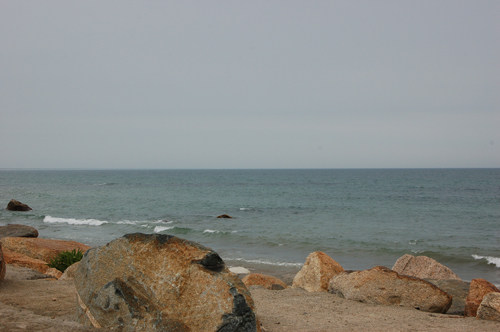
The concept behind some geological scientists labeling of the current era as the "Anthropocene" is that, having used, abused, and bred in vast abundance on the planet, now it is up to humans to make and keep the place habitable.
My friend Brendan Smith is an oysterman; he lives by harvesting and marketing these mollusks.
He's written a piece for The Atlantic, The Coming Green Wave: Ocean Farming to Fight Climate Change, that suggests we can find hope for a sustainable balance in ocean farming,
Smith explains that sea weed and shellfish can absorb and filter out huge quantities of the excess carbon dioxide and nitrogen that unthinking human exploitation of the planet has let loose. Sea weed can be used for biofuels without the pollution and cost in human foods that goes with using corn to make ethanol.… Rather than relying on mono-aquaculture operations, these new ocean farms are pioneering muti-tropic and sea-vegetable aquaculture, whereby ocean farmers grow abundant, high-quality seafood while improving, rather than damaging, the environment.
One example is Ocean Approved in Maine, which cultivates seaweed that doubles as a nutrient-rich food source and a sponge for organic pollutants. Farmers in Long Island Sound are exploring diversifying small-scale organic shellfish farms with various species of seaweed to filter out the pollutants, mitigate oxygen depletion, and develop a sustainable source for fertilizer and fish meal. In southern Spain Veta La Palma designed its farm to restore wetlands, and in the process created the largest bird sanctuary in Spain, with over 220 species of birds.
Seaweed farms alone have the capacity to grow massive amounts of nutrient-rich food. Professor Ronald Osinga at Wageningen University in the Netherlands has calculated that a global network of "sea-vegetable" farms totaling 180,000 square kilometers -- roughly the size of Washington state -- could provide enough protein for the entire world population.
The goal, according to chef Dan Barber -- named one of the world's most influential people by Time and a hero of the organic food movement -- is to create a world where "farms restore instead of deplete" and allow "every community to feed itself."But here is the real kicker: Because they require no fresh water, no deforestation, and no fertilizer -- all significant downsides to land-based farming -- these ocean farms promise to be more sustainable than even the most environmentally-sensitive traditional farms. …
Smith is well aware that what he is proposing is controversial.
Welcome to the Anthropocene. We broke it and it is up to us to fix it. Go read the whole article.We face a bitter new reality: Mitigating the effects of climate change may force us to develop our seas to save them -- and the planet. This re-imaging of the oceans will be heart-wrenching and controversial. Our waters are revered as some of the last wild spaces on Earth -- ungoverned and untouched by human hands. If we develop our oceans, farms will some day dot coastlines, mirroring our agricultural landscape. But in the face of the escalating climate crisis, we have little choice but to explore new ways of sustaining humanity while protecting the planet.
Despite every other legitimate concern, we cannot ignore that our economic and social system is rapidly making the planet less habitable. So I will be posting "Warming Wednesdays" and/or "Annals of the Anthropocene -- unpleasant reminders of an inconvenient truth.
No comments:
Post a Comment